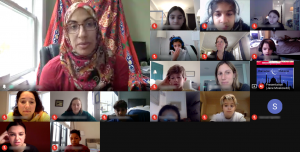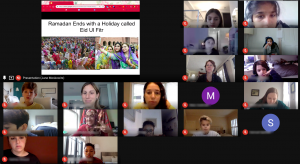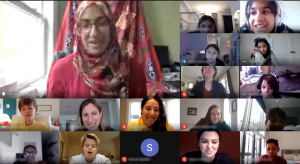Throughout the year, students at Gaynor spend time learning about and understanding social justice issues. In Head Teacher Jane Moskowitz’s Silver Cluster class, this includes learning about all elements of social justice, including the meaningful study of other cultures and religions. 
This week, the students discussed the holy month of Ramadan and what it means in the Muslim community.
To help solidify the things students learned about in class, Ms. Moskowitz and Assistant Teacher Sydney Strauss invited speaker Eman El-Badawi to talk with the students in their virtual classroom about the holiday.
Ms. El-Badawi is a scientist and Muslim woman from New Jersey who lives on a sheep farm with her husband and six children. She talked to the students to help them learn about Ramadan and better understand Islamic culture.
Ms. Moskowitz said, “We invited Eman El-Badawi into our virtual class to help bring the holiday to life.”
Ms. El-Badawi explained to students that Ramadan is a month on the lunar calendar where Muslims fast from sunup to sundown.
“One of the goals of Ramadan is to bring the family together, because sometimes we are too busy with our own lives to be present with our family,” Ms. El-Badawi said.
She then explained that while fasting may seem difficult, Ramadan also signifies a time for charity. She said while fasting during Ramadan is religiously prescribed, it is up to the individual whether they feel fit enough to fast. Exempt from fasting are young children, pregnant women, and those who are ill. She said that those unable to fast should still follow the requirements of being charitable and kind.
After fasting every day, she said they are rewarded with a feast, so that they feel that every day has a reward. She said the holiday also ends with a holiday called Eid Al Fitr, which is a celebration that lasts for three days.
Along with discussing Ramadan, Ms. El-Badawi also talked about different Muslim customs and traditions. However, she reminded students that all Muslims are different, and no two are alike.
After her presentation, students asked questions to help better their understanding of the holiday and religion.
Anya K. asked Ms. El-Badawi what it was like for her when she started fasting.
“In the beginning, I was miserable, but I knew I had to beat my brother and make it the whole month,” Ms. El-Badawi responded. “The day was difficult, but when I got to eat my meal, it felt so special — like a holiday.”
Ms. Moskowitz said it was meaningful for the class to hear directly from someone who actually celebrates the special holiday, and to learn about all the Ramadan traditions.
“Eman shared what Ramadan looks like for her and her eight-person family, including the challenges and tremendous rewards of the holiday (e.g. acting in charitable and kind ways),” she said. “Through pictures and stories, Eman truly gave our students a little slice of the Ramadan experience!”


